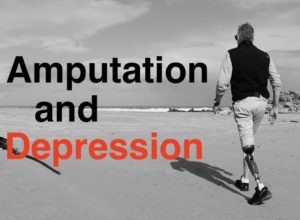
This is advice from one amputee to another. How to reduce amputee depression. These are practical tips divided into physical, emotional, mental, and spiritual aspects of depression. Here is how to reduce amputee depression.
Depression is anger turned inward. Here are some ways to deal with this emotion. You are not alone. Depression, unlike misery, does not like company. Use the support groups that are out there. Remember, you are not to blame. Support groups work very well redirecting the anger away from yourself and its accompanying self-blame. It is important that you feel that anger because it will lead to depression if you don’t.
Feeling Depressed?
Depression takes its physical toll by disrupting your sleep cycle. You can counter this by going to bed at the same time every night and not sleeping too much. An alarm clock will ensure that you don’t sleep too much. If you suffer from early nocturnal waking, be careful not to do things that will prolong your getting back to sleep. Drinking some Sleepytime tea while you listen to some quiet, peaceful music will help. Reading or watching TV will keep you awake. Nothing prolongs a depression more than not getting dressed. Even if it is a simple errand, it is important to get dressed and get out of the house. A short walk is an excellent way to combat depression—the more exercise, the better in this situation. These are ways how to reduce amputee depression.
Exercise helps with your strength and endurance. Even gentle activity helps decrease depression. Make sure you don’t do anything that may cause pain. Exercise and gentle movement help reduce depression. Learning to relax is very important. It is getting involved in a physical and recreational activity that does not cause you pain. Wear your prostheses; exercise and gentle movement help decrease depression. Practicing relaxation such as deep breathing helps to relax muscles, reduce pain, and focus your mind.
Be careful about how much alcohol you drink. Alcohol is a depressant. Eliminate other drugs that you use to self-medicate. If using prescription drugs, make sure you take them when prescribed.
Emotional Depression
Depression is anger turned inward. Here are ways how to reduce amputee depression. You are not alone. Depression, unlike misery, does not like company. Use the support groups that are out there. Remember, you are not to blame. Support groups work very well redirecting the anger away from yourself and its accompanying self-blame. It is important that you feel that anger because it will lead to depression if you don’t.
The emotional effect of depression is intimidating. To counter this, you can be assertive. Tell those around you what you need and don’t need. Tell your support system that you are dealing with losing your limb and fighting the grief that turns it inward. Always be aware of how they are coping with your depression. Give your loved ones the chance to express their feelings since they too have to adjust to your amputation loss. Those around you may not know what to do, so the more specific you can be about what you are going through, the better they can help. Caretaker burnout is often something you can see before they do.
Physical Depression
Fatigue is one of the most common symptoms of depression. Feeling stuck, unmotivated, and in a slump are common symptoms. Gentle exercise, even getting out of the house for a short walk every day, will increase your physical energy. Stretching, doing yoga, and taking on a martial art like Daichi will increase the amount of energy you have available and free it up from being bound to your depression. Laughter is a healer of depression. To increase your energy level, you may try meditation, guided imagery, and even hypnotherapy. Getting in touch with a support group is also very helpful. Most importantly, know that feelings will lessen over time.
Change your mental attitude from passive to active, and your depression will lift. Depressive thinking is hoping for a different outcome when you do the same thing over and over. You must replace this negative self-talk with positive affirmations. Individual psychotherapy will help. Consider a psychiatric medication evaluation at the same time. Studies have shown that a combination of psychotherapy and antidepressants works best in reducing depression.
Spiritually depression attacks your integrity and self-esteem. You need to forgive yourself and not judge so harshly the things you do and who you are. Many preconceptions keep you in a depressed state. Some psychologists prefer to think of it as a depressive cycle rather than just a stagnant depression. To strengthen your spirit, you will need to learn to think of yourself differently. Excepting support from significant others will remain independent will help increase your sense of self. This is how to reduce amputee depression.
How to Reduce Amputee Depression
In summary, ending your depression means taking more control over your life and accepting responsibility for how you lead it. Not blaming others or feeling trapped are important attitude changes that will improve your mood and learning to adjust is a process that takes time – so be gentle with yourself. Try not to isolate yourself or withdraw from people; use your experiences to build new memories and start new traditions to reach your goals. Sure, there will be adjustments along the road to success – but it is still your path. Who you have not changed. Always remember, you are much more than your physical experience.





